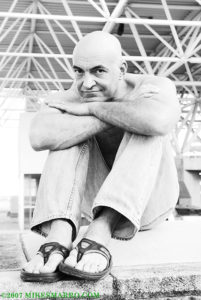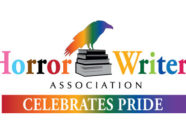
Greg Herren is an award winning author and editor who lives in New Orleans. He has published over thirty novels and about fifty short stories, give or take, and edited over twenty anthologies. His next novel, Bury Me in Shadows, will be released in October 2021. He is also working on a short story collection about things that go bump in the night–both human and otherwise– tentatively titled Monsters of Louisiana which he hopes to finish before he is buried in shadows.
What inspired you to start writing?
I used to joke that I became a writer because I was unemployable, but I can’t say that anymore since I’ve held my day job now for 16 years!
But seriously, as far back as I can remember I wanted to be a writer, to write…I learned how to read when I was very young and I’ve always been a big reader; I don’t know if it was innate, or something I was born with, but my earliest memories are of reading and scribbling stories down and using my sister’s dolls to act out stories. I guess my love of reading—the pleasure of losing myself in a story—led me to it; I got so much joy from reading I wanted to try to give other people that same joy.
What was it about the horror genre that drew you to it?
Horror is one of the few forms of art—regardless of form, whether it’s the written word or a visual medium—that can evoke a visceral reaction from the audience—physical, emotional, intellectual—and I’ve always thought that was impressive.
Horror is one of the few forms of art—regardless of form, whether it’s the written word or a visual medium—that can evoke a visceral reaction from the audience—physical, emotional, intellectual—and I’ve always thought that was impressive.
I’ve always loved being scared (which is weird, now that I think about it). When I was a kid, my grandmother introduced me to crime and suspense movies, and she also loved what she called (and I still call them this in my head) “scary movies”—I don’t think she ever called them horror—and I also loved the haunted houses at amusement parks. I’ve always, as long as I can remember, been partial to ghost stories more than anything else. My favorite Hardy Boys/Nancy Drew/kid’s mysteries always were about ghosts and phantoms. The Three Investigators’ The Secret of Terror Castle is one in particular I go back and reread every few years. Of course, there was always a rational explanation in those books for the hauntings…I remember seeing the original Robert Wise film version of Shirley Jackson’s The Haunting when I was really young and being absolutely terrified…and the book was even better. It remains one of my favorites to this day.
What has writing horror taught you about the world and yourself?
I feel that I am constantly, whenever I am writing a story or creating a new character, being forced to reevaluate and reexamine who I am, what I believe, what I feel, my strengths and my flaws. How much of myself do I put into my characters, and how honest am I when I do? We all like to imagine or believe we would rise to whatever occasion we encounter—whether it’s a werewolf on the prowl in our town, or a spree killer like Michael Myers—but would we? What strengths do I have that I could draw from in that situation, what weaknesses and fears would I have to overcome to survive?
I hate that horror is so often dismissed as not being a valid form of literature, because horror examines human frailty and strength and frequently explores the deepest themes of human existence: asking questions about life, death, values, belief systems, adaptability, religion, society and culture.
I feel that reading and writing horror has helped me grow and develop as a person, and those lessons learned from the self-examination exploring the questions horror fiction asks has helped me through some difficult periods. Your mileage might vary, of course.
How have you seen the horror genre change over the years? And how do you think it will continue to evolve?
That’s a very good question—one I could probably write a dissertation about, but I will try to be brief—which is not easy for me!
I’m hardly an expert in the field, but horror has always been a vehicle for writers to explore questions about society and humanity by using the supernatural, or the possible existence of the supernatural, to fill in for actual issues without actually naming them; giving the reader a way to process injustice, for one example, subconsciously without immediately becoming defensive. Horror fiction often tends to be about outsiders. There has been, for example, a lot of scholarship about Anne Rice’s vampires as HIV/AIDS allegories at a time when there were great societal fears about the epidemic, and stigma attached to the infected.
The horror in Jay B. Laws’ brilliant novel Steam was also an HIV/AIDS allegory, and the book deserves to have a much wider readership.
When I started reading (and watching) horror years ago, it was very white and heteronormative. A lot of books I read in the 1970’s and the 1980’s, by writers like Thomas Tryon and Michael MacDowell, were very coded in their queerness, but it was there for queer people to see and relate to. Take Tryon’s The Other, for example: I always read the character of Niles Perry as queer and identified with him very closely. It’s still one of my favorite novels—one I go back to and reread periodically; it’s so beautifully written and structured—but I feel if Tryon and MacDowell were alive and writing their horror today, they wouldn’t have to code the queerness so carefully. I also think Poppy Z Brite was enormously important; his work was blatantly queer at a time when such work wasn’t the norm, wasn’t as accepted, but the work was so strong readers responded to it. Clive Barker was also a huge game-changer.
And of course, we are seeing non-white writers getting the opportunities they may not have in the past—Victor LaValle is simply brilliant, and Silvia Moreno-Garcia’s Certain Dark Things still haunts me. I always look forward to anything new from Stephen Graham Jones. I love that Colson Whitehead is a literary writer who isn’t afraid to explore genre writing. Zone One was exceptional.
I think all genres and all publishing are now moving to greater inclusivity of voices that weren’t as welcomed in the past, and these new perspectives and voices are giving fiction a much-needed adrenaline shot, a reinvigoration our culture needs. It’s good for everyone—readers, writers, and editors alike.
When you’ve been excluded from the mainstream of society and the culture, you see things those inside of it might not, and those kinds of critiques and points of view are crucial for that society and culture to continue to grow and expand and develop
I also think we are seeing a renaissance of sorts in horror fiction—there is some exceptional work being done today.
How do you feel the LGBTQ community has been represented thus far in the genre and what hopes do you have for representation in the genre going forward?
Back when I was younger and hungry for any kind of representation, I was always happy to see even the worst stereotypes, frankly; bad representation was still representation. I know the gay-bashing hate crime at the beginning of Stephen King’s It has been heavily criticized, but when I read that scene originally back in 1986 I didn’t think oh this is offensive I thought hey, Stephen King is writing gay characters and showing how dangerous it is to be openly gay!
Of course, now I can see how that scene can be read as problematic, but that’s not how I saw it then.
Besides that, outside of the coding I mentioned earlier, I can’t really recall any representation in anything I read back then. In the 1990’s I became more aware of queer publishing and queer books, and while there wasn’t a lot of queer horror by queer writers being published by the queer presses, there were some. Jay B. Laws wrote two phenomenal books (Steam and The Unfinished ) but died from AIDS complications before the second was published. I know Lewis Gannett wrote a beautiful horror novel called The Living One that was published sometime in the late 1990’s, and there was a lot of queer vampire fiction. A lot of it was erotica, of course—there’s always been something sexual about vampires.
And Poppy Z Brite, of course, was doing amazing work in the 90’s.
I think non-queer writers aren’t afraid to include queer characters in their work now, and while I am not as widely read as I probably should be, I think the genre has been moving away from queer stereotypes and clichés for quite some time now. I also think mainstream publishing in general is more open now to queer writers and queer stories than it has been. Small presses have been doing the work for a very long time.
I’d love to see more, of course, and I am hopeful that will be the case in the future. We need more queer work, more queer writers, and more queer characters across the entire spectrum of our community.
Paul Tremblay’s A Cabin at the End of the World was extraordinary; I remember thinking while turning the pages compulsively, unable to stop reading, that twenty years ago—hell, even ten years ago—a novel centering a gay family would have never been written, or if so, not published by a major press.
Who are some of your favorite LGBTQ characters in horror?
Niles Perry from The Other, of course. Ghost from Poppy Z Brite’s Lost Souls. Julian Mayfair from Anne Rice’s The Witching Hour. The unnamed main character in Steve Berman’s Vintage. Theo in The Haunting of Hill House. God, there are so many!
Who are some LGBTQ horror authors you recommend our audience check out?
Norman Prentiss is terrific. Victoria A. Brownworth’s short story collection Day of the Dead and her Lambda winning novel Ordinary Mayhem are very overlooked. Jameson Currier has written some terrific literary ghost stories. Craig Laurence Gidney. Michael Thomas Ford’s Lily. Lee Thomas, of course—I’ll read anything he writes. Alex Jeffers. Tom Cardamone. Carmen Maria Machado. Those are a great place to start…but there really are so many, many more. Someone really should make a comprehensive list.
What is one piece of advice you would give horror authors today?
Don’t be afraid to push boundaries, with characters and themes and stories—but do your homework if you are writing outside your experience. And never say “Well, if I can write about vampires and werewolves why do I need to research queer people to write about them?”
And to the LGBTQ writers out there who are just getting started, what advice would you give them?
Don’t be afraid to tell your stories.


